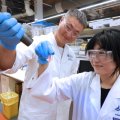The Faculty of Social and Behavioural Sciences (SBS) and the Institute for Social Science Research (ISSR) has celebrated the achievements of their emerging researchers at the annual Research and Innovation Awards ceremony on Wednesday, September 22.
Early career researchers, Dr Paul E. Dux from the School of Psychology, and Dr Katie Makar, from the School of Education, were acknowledged for their outstanding contributions to research and innovation at UQ.
Dr Dux was awarded the Research Award for his work into the brain’s ability to multi-task, while Dr Makar received the Research and Innovation Award for her study of inquiry-based teaching and learning in mathematics and statistics.
SBS Associate Dean (Research), Associate Professor Matthew Hornsey, said the awards were a wonderful opportunity to highlight the exciting research and commercialisation activity conducted in the Faculty and the Institute.
"I congratulate Dr Dux and Dr Makar on their achievements. Their commitment and dedication to the field of social sciences is exceptional," he said.
"Translating knowledge into action is at the heart of what the SBS Faculty and the Institute hope to achieve, it is very pleasing to see our researchers helping to make the world a better place."
This year, the winners were presented with their awards by Professor Alan Lawson, Pro-Vice-Chancellor (Research and International).
About the winners:
2010 WINNER: RESEARCH AWARD
Dr Paul E. Dux
Dr Paul E. Dux, a cognitive neuroscientist from UQ’s School of Psychology, along with researchers from the United States, have pinpointed a region in the brain – the lateral prefrontal cortex – that limits our capacity to carry out more than one task at the same time.
Using a combination of functional magnetic resonance imaging (fMRI) and psychophysics, Dr Dux and his colleagues found that when people were juggling two tasks (multi-tasking), their prefrontal cortex appeared to deal with the tasks one-by-one – reflecting a bottleneck in information processing.
"Our brain is terrible at multi-tasking. Even performing simple tasks, that rely on different sensory and motor systems, can be problematic – as soon as the decision process for either task overlaps in time, we can’t do them both without performance suffering," Dr Dux said.
Dr Dux and his colleagues have found that, with training, our brain’s processing capabilities can be enhanced.
"It’s not like you become able to multi-task through practice, it's just that you become able to do each task very quickly, thus they overlap in time less," said Dr Dux.
"The jury is still very much out regarding whether or not one can become generally a good 'multi-tasker', independent of the task, with training."
Dr Dux's research is significant for understanding performance limits in the real world and also in clinical settings, as many mental disorders are characterised by impairments in attention and multi-tasking.
Dr Dux's research has appeared regularly in prestigious psychology and neuroscience journals, and the Australian Psychological Society recognised him for this in 2009 by awarding him their Early Career Research Award.
2010 WINNER: RESEARCH AND INNOVATION AWARD
Dr Katie Makar
Dr Katie Makar is well respected both nationally and internationally for her contributions to the field of maths education.
With a focus on inquiry-based teaching and learning in mathematics and statistics, Dr Makar's innovative research project is responding to a need to provide practical classroom guidance for teachers undertaking inquiry-based teaching practices.
The project has developed a new model for understanding the process of teachers' learning to teach open-ended inquiry in mathematics and statistics.
"In order to create learning experiences for their students which foster persistence, flexibility and insightful mathematical thinking, they must develop this capability themselves as educators," she said.
Dr Makar and teachers taking part in her research co-authored three, evidence-based books on teaching mathematical inquiry. The uniqueness of the books is their use of authentic ill-structured problems integrating deep mathematical concepts with higher order thinking in new and engaging ways.
"My co-authors, Sue Allmond and Jill Wells, and I, are really excited about these books, designed to help teachers get started and persist with learning to teach mathematics using authentic problems," Dr Makar said.
Dr Makar's research has been presented across five continents and she recently received an Early Career Research Award for outstanding research from the Mathematics Education Research Group of Australasia.
Media: Helen Burdon (h.burdon@uq.edu.au, 3346 9279).
.jpg)









